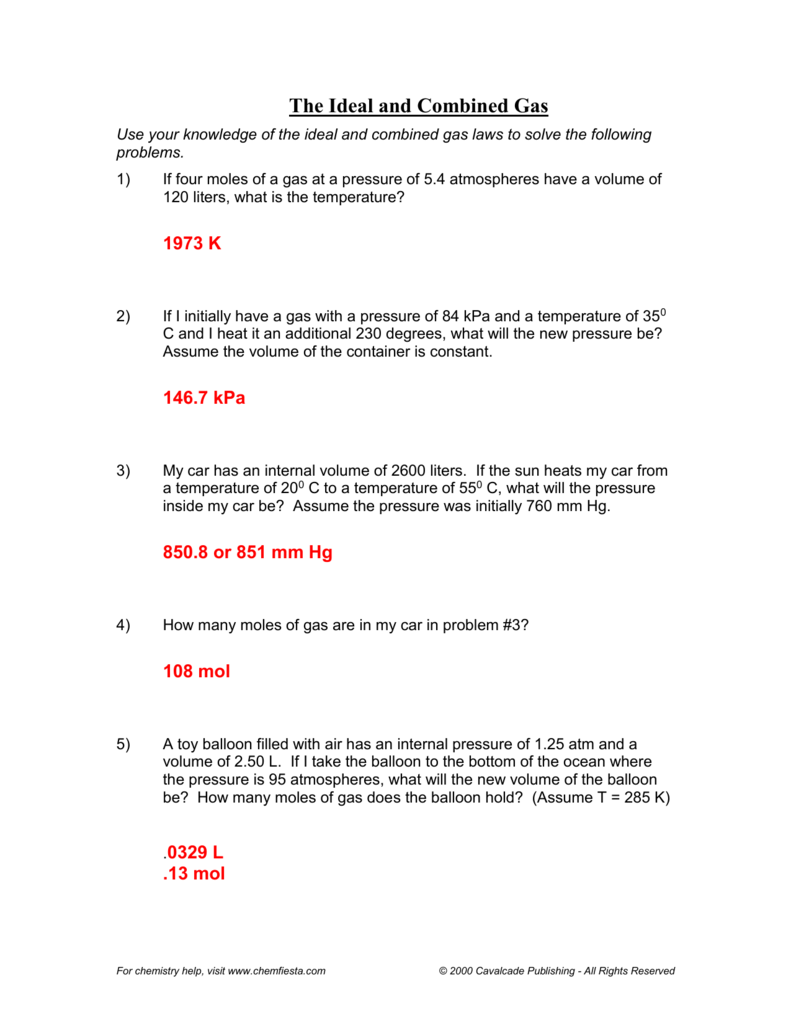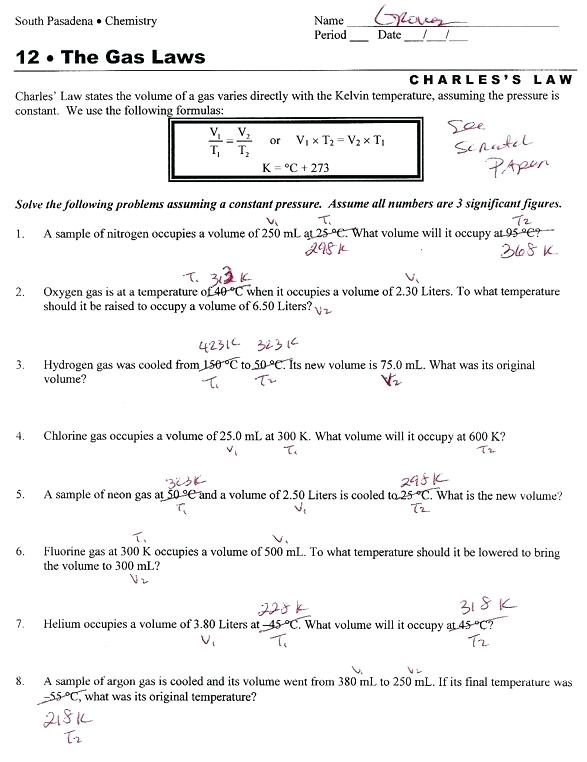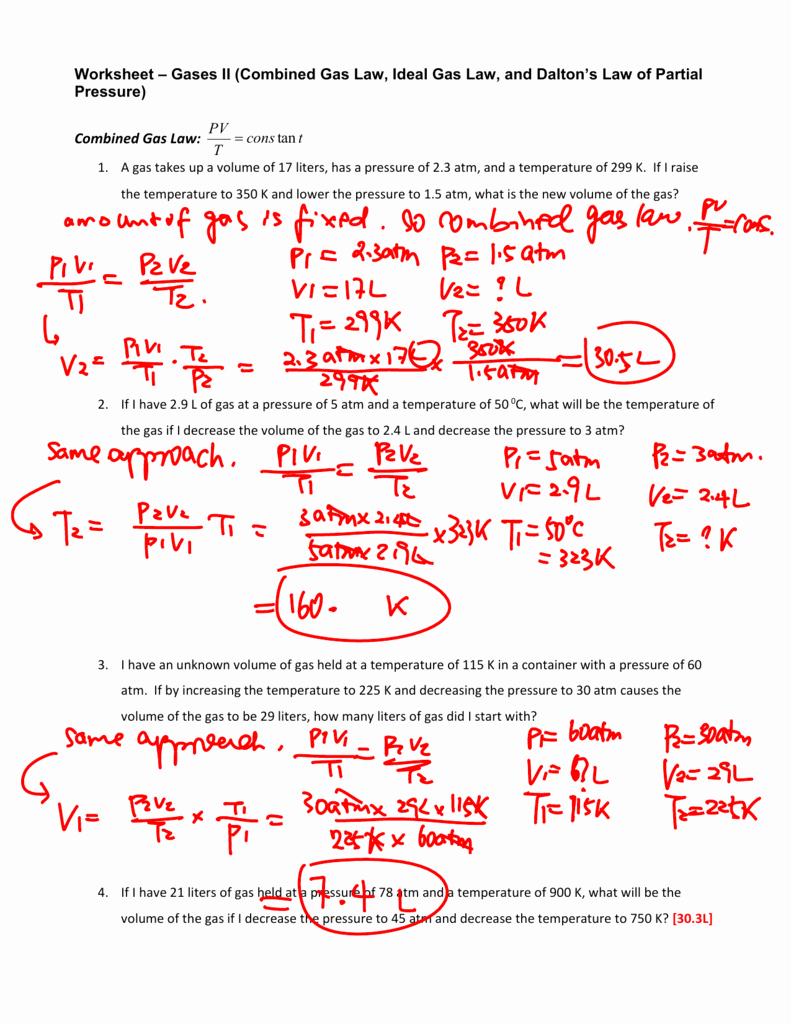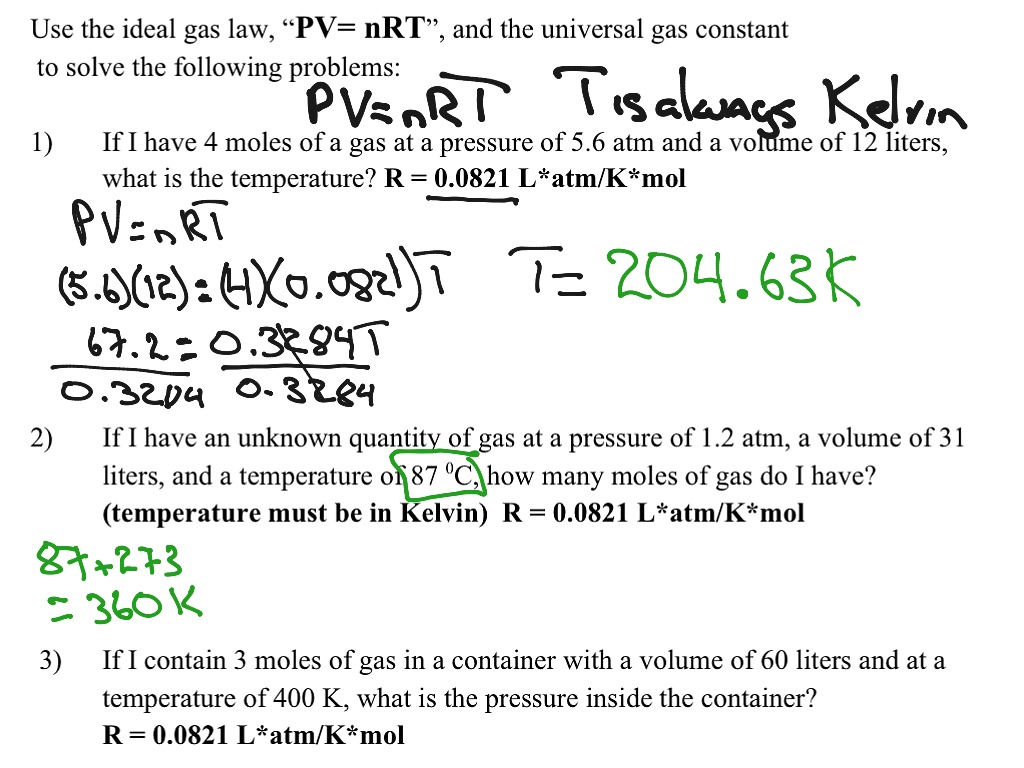Ideal Gas Law Worksheet Answers
Ideal Gas Law Worksheet Answers - Show your work, including proper units, to earn full credit. The ideal gas law states that pv=nrt, where p is the pressure of a gas, v is the volume of the gas, n is the number of moles of gas present, r is the. How many moles of gas (air) are in the lungs of an adult with a lung capacity of 3.9 l? The ideal gas law directions: The gas laws worksheet focuses on several fundamental gas laws, such as boyle’s law, charles’s law, avogadro’s law, and the ideal. 1) given the following sets of values, calculate the unknown quantity. 2) at what temperature would 2.10 moles of n2 gas have a. Solve each of the following problems. Assume that the lungs are at.
The ideal gas law directions: Show your work, including proper units, to earn full credit. How many moles of gas (air) are in the lungs of an adult with a lung capacity of 3.9 l? 2) at what temperature would 2.10 moles of n2 gas have a. 1) given the following sets of values, calculate the unknown quantity. The gas laws worksheet focuses on several fundamental gas laws, such as boyle’s law, charles’s law, avogadro’s law, and the ideal. Assume that the lungs are at. The ideal gas law states that pv=nrt, where p is the pressure of a gas, v is the volume of the gas, n is the number of moles of gas present, r is the. Solve each of the following problems.
Solve each of the following problems. The ideal gas law directions: 2) at what temperature would 2.10 moles of n2 gas have a. How many moles of gas (air) are in the lungs of an adult with a lung capacity of 3.9 l? Show your work, including proper units, to earn full credit. The ideal gas law states that pv=nrt, where p is the pressure of a gas, v is the volume of the gas, n is the number of moles of gas present, r is the. The gas laws worksheet focuses on several fundamental gas laws, such as boyle’s law, charles’s law, avogadro’s law, and the ideal. 1) given the following sets of values, calculate the unknown quantity. Assume that the lungs are at.
Gas Laws Worksheet answer key Gas Laws Worksheet atm = 760 mm Hg
Assume that the lungs are at. 1) given the following sets of values, calculate the unknown quantity. Show your work, including proper units, to earn full credit. The ideal gas law directions: The ideal gas law states that pv=nrt, where p is the pressure of a gas, v is the volume of the gas, n is the number of moles.
Ideal Gas Law Worksheet PV = nRT
Show your work, including proper units, to earn full credit. Assume that the lungs are at. Solve each of the following problems. The gas laws worksheet focuses on several fundamental gas laws, such as boyle’s law, charles’s law, avogadro’s law, and the ideal. 1) given the following sets of values, calculate the unknown quantity.
Ideal Gas Law Questions And Answers
The ideal gas law states that pv=nrt, where p is the pressure of a gas, v is the volume of the gas, n is the number of moles of gas present, r is the. The gas laws worksheet focuses on several fundamental gas laws, such as boyle’s law, charles’s law, avogadro’s law, and the ideal. The ideal gas law directions:.
Ideal Gas Law Practice With Answers
How many moles of gas (air) are in the lungs of an adult with a lung capacity of 3.9 l? The ideal gas law states that pv=nrt, where p is the pressure of a gas, v is the volume of the gas, n is the number of moles of gas present, r is the. The gas laws worksheet focuses on.
Ideal Gas Law Worksheet Answers
Show your work, including proper units, to earn full credit. Assume that the lungs are at. The gas laws worksheet focuses on several fundamental gas laws, such as boyle’s law, charles’s law, avogadro’s law, and the ideal. 2) at what temperature would 2.10 moles of n2 gas have a. How many moles of gas (air) are in the lungs of.
Ideal Gas Law Worksheet 144 Answer Key Greenus
The gas laws worksheet focuses on several fundamental gas laws, such as boyle’s law, charles’s law, avogadro’s law, and the ideal. Solve each of the following problems. 2) at what temperature would 2.10 moles of n2 gas have a. The ideal gas law states that pv=nrt, where p is the pressure of a gas, v is the volume of the.
Ideal Gas Law Worksheet Science ShowMe
Solve each of the following problems. The gas laws worksheet focuses on several fundamental gas laws, such as boyle’s law, charles’s law, avogadro’s law, and the ideal. The ideal gas law directions: Assume that the lungs are at. Show your work, including proper units, to earn full credit.
SOLUTION Ideal gass law worksheet Studypool
The gas laws worksheet focuses on several fundamental gas laws, such as boyle’s law, charles’s law, avogadro’s law, and the ideal. 1) given the following sets of values, calculate the unknown quantity. Solve each of the following problems. Assume that the lungs are at. Show your work, including proper units, to earn full credit.
Ideal Gas Law Problems Worksheet Worksheets For Kindergarten
Assume that the lungs are at. How many moles of gas (air) are in the lungs of an adult with a lung capacity of 3.9 l? Show your work, including proper units, to earn full credit. The ideal gas law states that pv=nrt, where p is the pressure of a gas, v is the volume of the gas, n is.
Ideal Gas Law Worksheet 2 Answer Ideal Gas Law Worksheet PV = nRT Use
Assume that the lungs are at. 1) given the following sets of values, calculate the unknown quantity. Show your work, including proper units, to earn full credit. How many moles of gas (air) are in the lungs of an adult with a lung capacity of 3.9 l? Solve each of the following problems.
Assume That The Lungs Are At.
1) given the following sets of values, calculate the unknown quantity. The ideal gas law states that pv=nrt, where p is the pressure of a gas, v is the volume of the gas, n is the number of moles of gas present, r is the. Solve each of the following problems. How many moles of gas (air) are in the lungs of an adult with a lung capacity of 3.9 l?
The Ideal Gas Law Directions:
2) at what temperature would 2.10 moles of n2 gas have a. Show your work, including proper units, to earn full credit. The gas laws worksheet focuses on several fundamental gas laws, such as boyle’s law, charles’s law, avogadro’s law, and the ideal.









